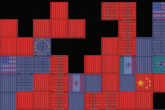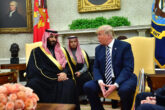September 24, 2017
Iran's Post-Sanctions Financial Windfall Was Overstated. What Does That Mean for Policy?
The Trump administration seems poised to scuttle the Iran nuclear agreement, the Joint Comprehensive Plan of Agreement (JCPOA). If it does, this decision will be a triumph for the deal’s critics, who have aggressively undersold the JCPOA’s achievements in limiting the country’s nuclear program and oversold the economic relief it gave Iran. Indeed, the discrepancy between what critics have said and what actually occurred should be a warning that assumptions circulated in the press about the economic benefits for Iran associated with the deal, and the supposed power that new unilateral U.S. sanctions could have on Iran, may be more political than empirical. American policymakers should ensure that these wrong assumptions do not inform U.S. foreign policy going forward.
Read the full op-ed in The National Interest.
More from CNAS
-
Transatlantic Security / Middle East Security / Energy, Economics & Security
Sanctions Aren’t Enough to Shut Down the Moscow-Tehran Black Market for WarThe geographic scope and extent of Iranian-Russian cooperation highlights the failure of traditional sanctions to prevent Moscow and Tehran from seeking key components like ch...
By Delaney Soliday
-
Game Over?
The trade wargame suggests that sustained high tariffs could create leverage and urgency to spur action toward a productive restructuring of the international trade system....
By Emily Kilcrease & Geoffrey Gertz
-
Middle East Security / Energy, Economics & Security
Trump Inks $600 Bn Deal In Saudi Arabia | Musk, Blackrock CEO Flank Trump In Gulf VisitIn today's episode of India Global, U.S. President Donald Trump secured a $600 billion commitment from Saudi Arabia on Tuesday to invest in the United States. NDTV's Gaurie Dw...
By Daniel Silverberg
-
Energy, Economics & Security / Technology & National Security
Tariffs and Tech: An Uncertain RecipeHigher tariffs could prompt American cloud companies to shift more of their capital investments abroad....
By Pablo Chavez




